Leslie Grossman’s 25 Years of Being Your Secret Best Friend
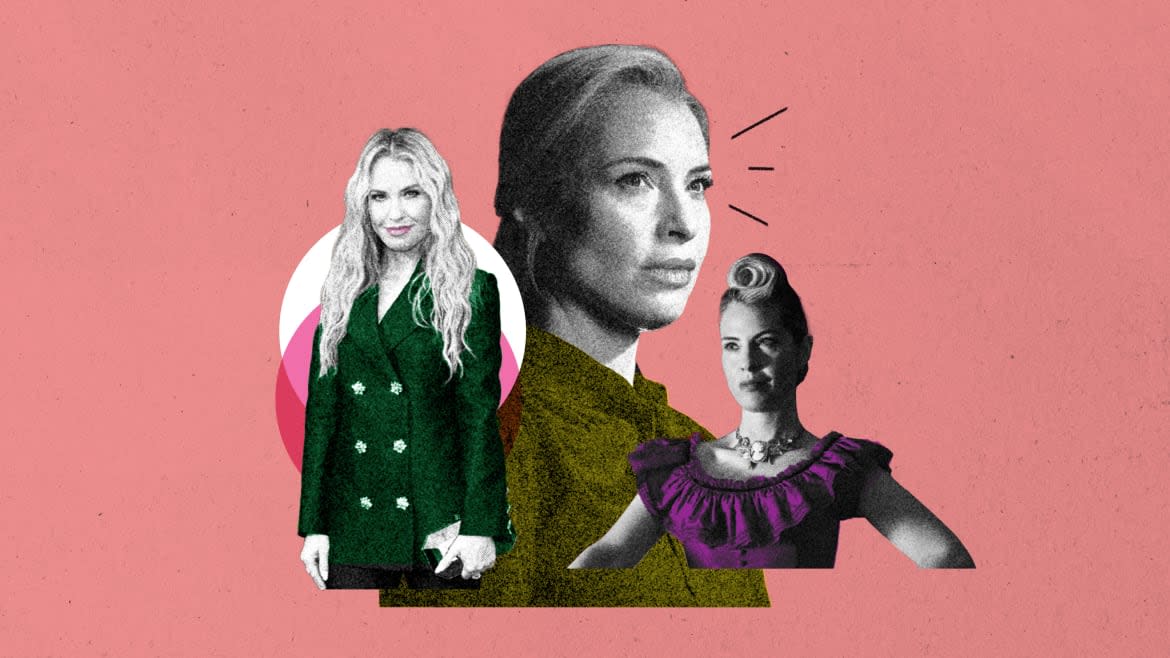
Leslie Grossman just received devastating news. When the actress logged onto our Zoom interview, she was in despair. I would say that, based on my observation, she was spiraling. To quote one of the noted Bravo fan’s beloved Real Housewives: This is a crisis.
Her iPhone is frozen. No buttons are working. The screen isn’t sliding. Then, the true sign of doom: she can’t even power it down. Grossman is sitting cross-legged on her unmade bed—“Don’t judge me”—and leans into the computer screen, staring through the Zoom camera and into the depths of my soul: “Kevin! What do I do?” She is pleading. “I don’t want to go to the Verizon store, Kevin. I can’t have this be my day!”
Several minutes of (ultimately useless) troubleshooting and some Lamaze-like calming breaths later, Grossman has accepted her fate. “I’m going to go to the store and they’re going to be like, ‘It will be 14 hours before someone can talk to you,’” she says. “Anyway, this is not your problem, and maybe something magic will happen if I stop freaking touching it. Alright, let’s talk…”
The occasion for this talk is Grossman’s role on American Horror Story: NYC, which wrapped up its 11th season on Wednesday. It’s her fifth journey into Ryan Murphy’s macabre universe, which reinvents itself each year with a new setting and story, but often casts new characters from a regular troop of actors. It’s been nearly 25 years since Grossman first met Murphy, when she auditioned for his TV series Popular. The campy WB teen dramedy was both of their first major TV shows, and they’ve worked together consistently since.
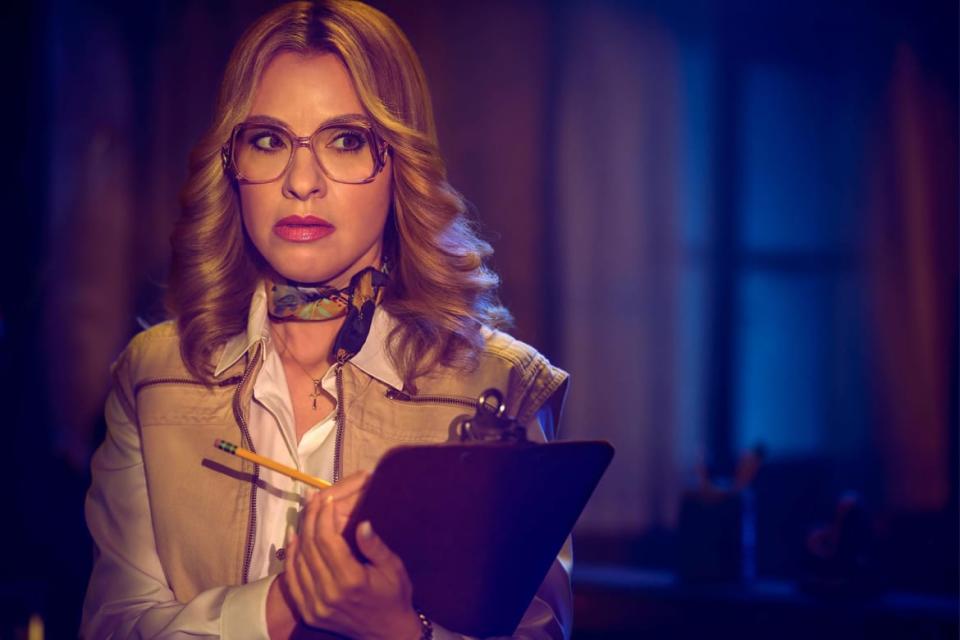
Grossman’s five seasons on American Horror Story, in particular, have been a showcase for her chameleonic abilities. In NYC, which takes place against the backdrop of the early days of the AIDS epidemic (rather, the show’s a metaphor for that epidemic), she plays Barbara. After her husband (Russell Tovey’s Patrick) came out of the closet and divorced her, she has struggled to pick up the pieces of her life. It’s a vulnerable turn in impressive contrast to, say, Coco St. Pierre Vanderbilt, a wealthy witch modeled in part by Real Housewives alum Tinsley Mortimer in the Apocalypse season.
Over the last two decades, Popular has become a cult favorite with an intense, nostalgic fanbase. Similarly, the sitcom What I Like About You, in which Grossman played best friend to Jennie Garth, developed a passionate following when it went into syndication. Her IMDb page is a practically endless list of appearances on popular shows: The Good Place, Grey’s Anatomy, Scandal, Nip/Tuck, Black-ish, and dozens more.
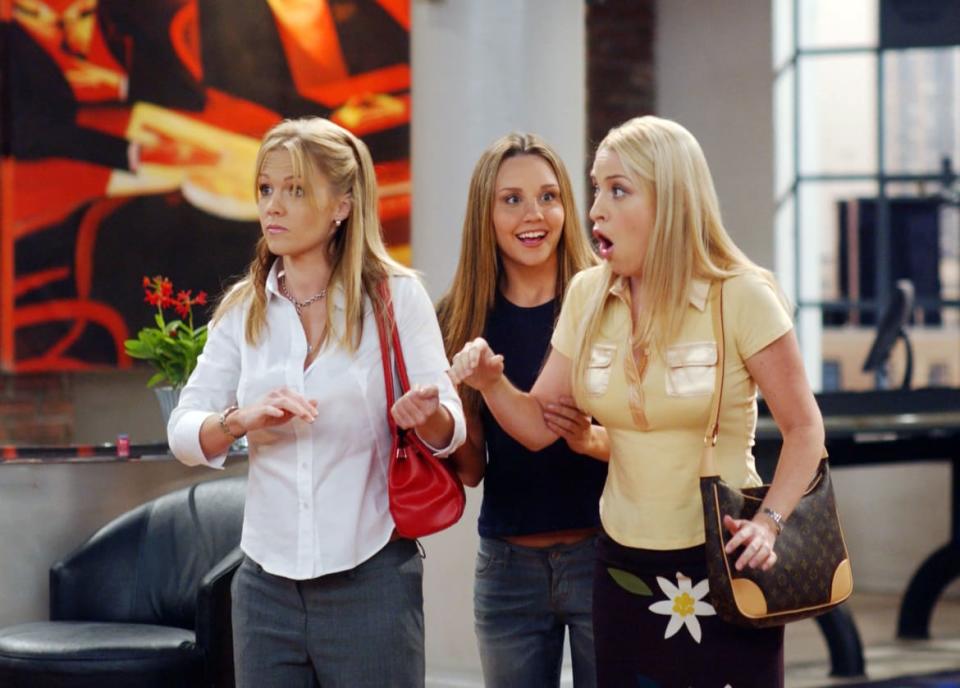
Based on my own impression of Grossman’s career, we had a Big First Question ready to open up our conversation with. But Grossman—lassoing me into her iPhone meltdown the second we connected, as if we were sitting on her bed chatting together—sort of beat me to the punch: Why is it that people who don’t know you feel like they really know you?
She laughs. “Absolutely, that’s a thing.” In other words, Leslie Grossman might be one of your favorite actresses and quite possibly your best friend—even though you’ve never met.
While she was raised in Los Angeles, she credits this phenomenon to a decidedly non-showbiz-y upbringing. Her dad was a corporate litigator, and her mom was an urban planner. “I was raised by intellectual Jews to be a nerdy intellectual Jew.”
Ryan Murphy Wanted ‘American Horror Story: 1984’ Costumes to ‘Drip in Sex’
In her parents’ minds, she was going to become an attorney, an architect, or a teacher. Grossman didn’t start acting professionally until she was 24, a decision made after studying for the LSAT test and feeling her soul start to painfully leave her body. When she told her parents she was going to pursue acting instead, they wept. “And then they said, ‘Can you be a rabbi? That’s like performing!” Even now, after 25 years in the business, they remind her, “It’s not too late to go to law school.”
A late start and a lifetime of feeling like an outsider among the Hollywood machine contributes to the relatability. She says she still feels more like a fan than anything else. “You think when I met fucking Patti LuPone I wasn’t dying over that?” she says about her AHS: NYC costar. She estimates the real reason that people feel cosmically connected to her is because she is, in her words, “really normal.”
“I didn’t get into the business because I was some great beauty,” she says. “A lot of people are in the business because they were the prettiest girls at their high school or whatever, and it’s like, ‘What are you going to do? Of course you’re going to be in front of the camera!’ I had a very different journey to getting here. I’ve always felt: Am I really doing this? Is this really my job? Or am I still going to go to law school?”
Then there’s the Popular of it all.
On the series, which ran from 1999 to 2001, she played Mary Cherry, a spoiled, somewhat dim, and possibly unstable cheerleader with a simmering homicidal streak. It’s the kind of outrageous, broad comedy character Murphy would become known for scripting, but in the Dawson’s Creek teen soap era, it was a blissfully unusual addition to the TV landscape. That’s exactly what fans latched onto.
“With Ryan, they kept trying to put a square peg in a round hole,” Grossman says. “But this was never going to be a normal teen drama. This was a show written by and for gay men in their thirties.”
If there’s one thing she’s found over the years, it’s that those gay men never went away. “Truly on a daily basis, people speak to me about the show—whether it’s on social media or in person—and how much it meant to them as a young gay person,” she says. “They might not have even known they were gay because they were so young. But they realize, ‘There is a sensibility here that is resonating with me very strongly.’”
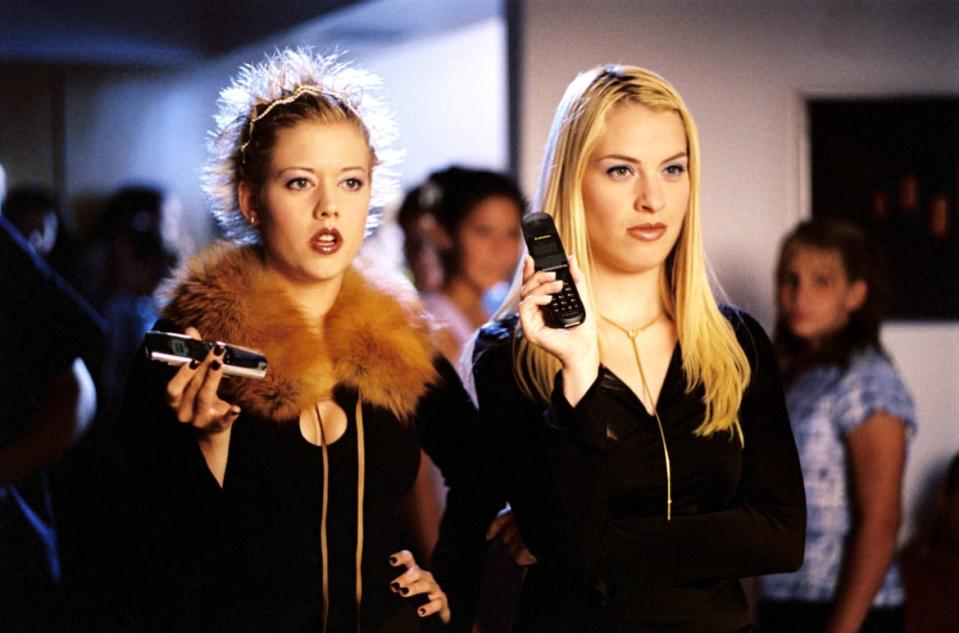
In a way, Popular being her first series may have hurt her going forward. Everything about the show was about being extreme. All she was ever trying to do was make Murphy laugh. It just turns out that not everyone else in Hollywood found it so funny.
“Forever, people were like, ‘You’re too weird: Your face is weird. Your voice is weird. We don’t get you,’” she says. “I had to figure it out for myself. I kept myself employed, doing series, doing guest star parts, doing pilot after pilot—pilots that didn’t get picked up. And I’ve always had Mr. Murphy. Ryan was always like, ‘I like all that you’re selling. I buy what you’re selling, and I’m gonna give you a platform so everybody can see what I like in you.’”
If Grossman’s collaboration with Murphy had ended with Popular, she would have said “dayenu” and considered herself lucky. They maintained a great friendship, and she appeared on his series Nip/Tuck and The New Normal. Still, not only would she never have been so presumptuous as to assume that he would cast her on a project like American Horror Story, but she never saw herself fitting into a series in that genre and with a cast that prestigious. When Murphy recruited her for the show’s seventh season, Cult, she was “scared and really overwhelmed.”
That feeling hasn’t necessarily gone away, even now that she’s been a part of five seasons. In NYC, for example, she had a pivotal scene with Joe Mantello, the legendary Broadway director and Tony-winning actor. The cast was filming on location in Manhattan. She was nervous about measuring up to Mantello’s skills. Everything was distracting: It was about 100 degrees. Pedestrians kept walking through the shot. Neighbors were hanging out their windows to watch. And then a producer relayed that they were going to have to hold for 20 minutes because a woman had been walking across the street and, apparently, dropped dead.
“I was like, ‘I’m sorry, she died?!’” Grossman remembers. “I’m in a full-body sweat. Someone has died. I’m so intimidated to be working with Joe.” But, as is the case when things seem so daunting at first, acting in that scene is now one of the highlights of her career.
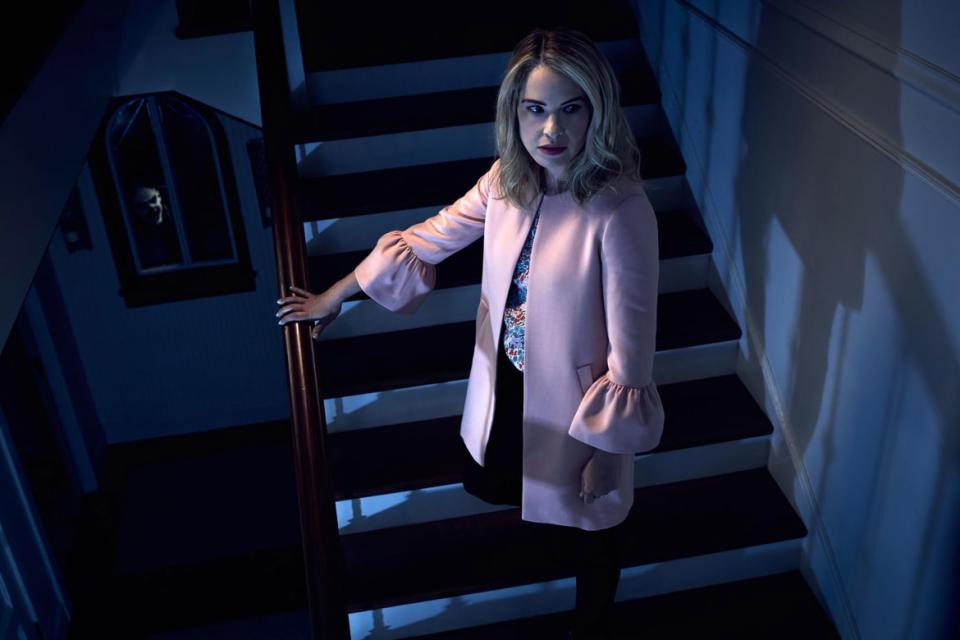
The entirety of the American Horror Story experience is one of those highlights, and not just for professional reasons. At the time she was first cast, her marriage was ending. Things were “unraveling in that world,” she says. She was 45 and didn’t know what was going to be next for her as an actress. “Which, in this business, is when they go, ‘Wrap it up!’”
She remembers when she started at age 25, there was a certain look every actress needed to have to book jobs. “I never was going to play the ingénue, and I really leaned into that,” she says. “That was incredibly freeing.” Early in her career, she read an interview with Shirley MacLaine in which the actress said, Grossman paraphrases, “If you’re funny, you’ll work forever. You don’t get constrained by what you look like.”
That resonated with her. Decades later, it’s somewhat of a mantra.
“Would it have been so fun to look like a supermodel? Sure,” Grossman says. “But what do I want in my career? Longevity. So then it was like, ‘Oh, I’m lucky. I’m lucky because I’m kind of weird.’ When you don’t fit into any specific niche, that can be frustrating. And sometimes it can lead you to a much more circuitous route to getting a job. I do think it also leads to a little more opportunity, because you can just do more things.”
She’s managed to stay employed in Hollywood ever since she first devastated her parents with her decision to be an actress, which, more than any specific role or project, is what she’s most proud of in her career. “I just turned 51 last week, and I truly feel like I’m getting started.”
And besides, law school isn’t going anywhere.
Get the Daily Beast's biggest scoops and scandals delivered right to your inbox. Sign up now.
Stay informed and gain unlimited access to the Daily Beast's unmatched reporting. Subscribe now.